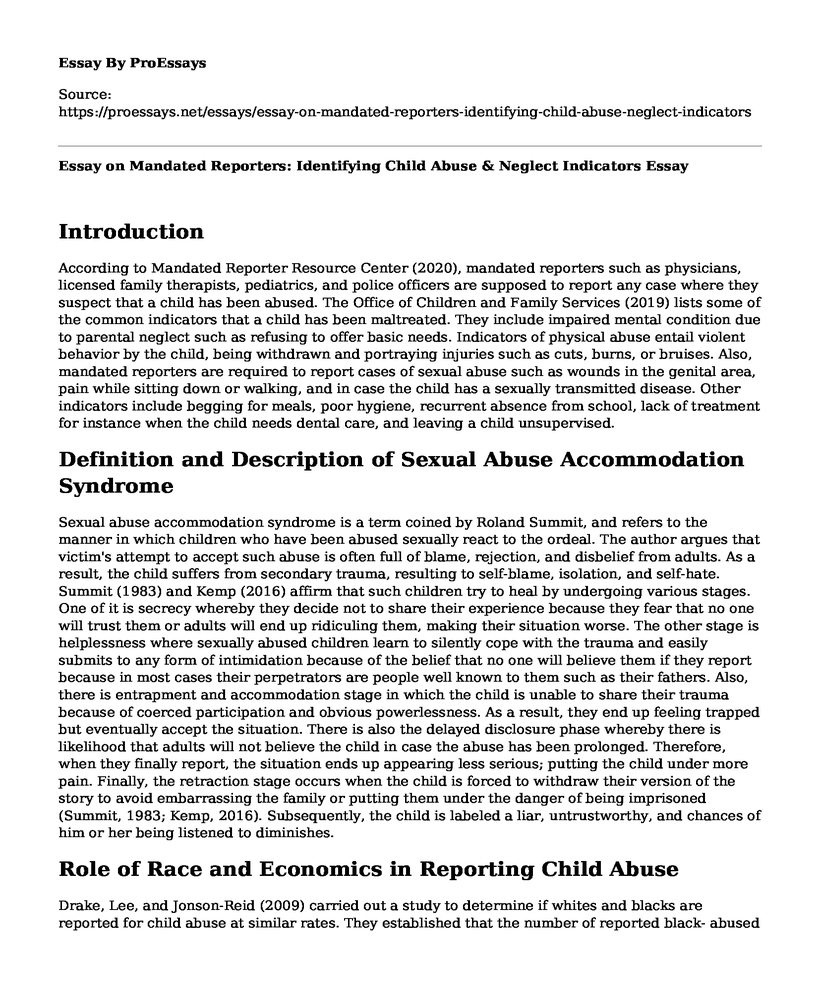Introduction
According to Mandated Reporter Resource Center (2020), mandated reporters such as physicians, licensed family therapists, pediatrics, and police officers are supposed to report any case where they suspect that a child has been abused. The Office of Children and Family Services (2019) lists some of the common indicators that a child has been maltreated. They include impaired mental condition due to parental neglect such as refusing to offer basic needs. Indicators of physical abuse entail violent behavior by the child, being withdrawn and portraying injuries such as cuts, burns, or bruises. Also, mandated reporters are required to report cases of sexual abuse such as wounds in the genital area, pain while sitting down or walking, and in case the child has a sexually transmitted disease. Other indicators include begging for meals, poor hygiene, recurrent absence from school, lack of treatment for instance when the child needs dental care, and leaving a child unsupervised.
Definition and Description of Sexual Abuse Accommodation Syndrome
Sexual abuse accommodation syndrome is a term coined by Roland Summit, and refers to the manner in which children who have been abused sexually react to the ordeal. The author argues that victim's attempt to accept such abuse is often full of blame, rejection, and disbelief from adults. As a result, the child suffers from secondary trauma, resulting to self-blame, isolation, and self-hate. Summit (1983) and Kemp (2016) affirm that such children try to heal by undergoing various stages. One of it is secrecy whereby they decide not to share their experience because they fear that no one will trust them or adults will end up ridiculing them, making their situation worse. The other stage is helplessness where sexually abused children learn to silently cope with the trauma and easily submits to any form of intimidation because of the belief that no one will believe them if they report because in most cases their perpetrators are people well known to them such as their fathers. Also, there is entrapment and accommodation stage in which the child is unable to share their trauma because of coerced participation and obvious powerlessness. As a result, they end up feeling trapped but eventually accept the situation. There is also the delayed disclosure phase whereby there is likelihood that adults will not believe the child in case the abuse has been prolonged. Therefore, when they finally report, the situation ends up appearing less serious; putting the child under more pain. Finally, the retraction stage occurs when the child is forced to withdraw their version of the story to avoid embarrassing the family or putting them under the danger of being imprisoned (Summit, 1983; Kemp, 2016). Subsequently, the child is labeled a liar, untrustworthy, and chances of him or her being listened to diminishes.
Role of Race and Economics in Reporting Child Abuse
Drake, Lee, and Jonson-Reid (2009) carried out a study to determine if whites and blacks are reported for child abuse at similar rates. They established that the number of reported black- abused children in the welfare system as compared to the general population is quite high because of racial biasness, increased likelihood of being poor or being in single-family homes. Research has shown that there is racially uneven reporting since child maltreatment does not discriminate any race. Black children are often disproportionately reported for child abuse, mostly be mandated reporters due to unequal rates of poverty among the African-Americans. The main reason is because disenfranchised and poor families are highly likely to come into direct contact with mandated reporters such as social workers than wealthy families. Drake, Lee, and Jonson-Reid (2009) also asserts that such professionals are unlikely to report well-off families because they feel there is no need for them to be involved in child protection services or are afraid of losing potential clients.
What surprised me about the Responsibilities of Mandated Reporters?
I was surprised that mandated reporters have a major role to play in society in ensuring the wellbeing of children yet in some cases they are easily compromised, resulting to over reporting of minority groups. I do not expect such professionals to be biased or report based on someone's economic or racial status. It is evident that there is a need to prevent such discrimination to ensure all abused children receive the treatment and help they require. It is essential that mandated reporters undergo more training to address such concerns, and reduce cases of racism and institutional classism.
References
Drake, B., Lee, S., & Jonson-Reid, M. (2009). Race and child maltreatment reporting: are blacks overrepresented? Child Youth Services Review, 31 (3), 309-316.
Kemp, A. (2016). Abuse in society: an introduction. Long Grove, IL: Waveland Press.
Mandated Reporter Resource Center. (2020). Who are mandated reporters? Retrieved from http://www.nysmandatedreporter.org/MandatedReporters.aspx
Office of Children and Family Services. (2019). Mandated reporters in New York state. Retrieved from https://ocfs.ny.gov/main/publications/Pub1159.pdf
Summit, R.C. (1983). The child sexual abuse accommodation syndrome. Child Abuse and Neglect, 7, 177-193.
Cite this page
Essay on Mandated Reporters: Identifying Child Abuse & Neglect Indicators. (2023, Apr 05). Retrieved from https://proessays.net/essays/essay-on-mandated-reporters-identifying-child-abuse-neglect-indicators
If you are the original author of this essay and no longer wish to have it published on the ProEssays website, please click below to request its removal:
- Rebel Girls and Union Maids - Article Review Sample
- Do Media and Social Media Shape What We Believe - Research Paper Example
- Paper Example on Childhood Obesity
- Integration and Assimilation of Mexican Americans Essay
- Paper Example on Poverty: A Denial of Choices and Human Dignity
- A Tale of Two Worlds: Essay Sample on Growing Up Straddling Two Cultures
- Research Paper on Online Human Trafficking: Exploitation Enabled By Internet Platforms







